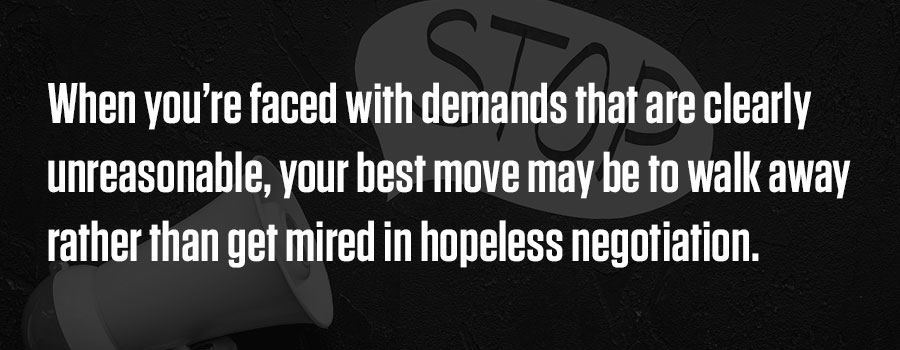
When Should You Stop Pursuing A Sales Lead?
This blog is all about lead generation, but today the topic is lead termination. Reluctant as sales people are to give up on any lead, it's physically impossible to follow up forever on every lead that's been generated. At some point, you just have to stop. And yet, every accomplished sales person knows that persistence pays off. If you quit after eight attempts, you wonder if number nine would have been successful. It's this type of thinking, along with sheer stubbornness, that may keep you chasing leads longer than you should.
The problem is, if you spend too much time chasing leads that never pan out, you have less time to follow up on leads that you can close. Persistence is admirable … up to a point. At what point does persistence become a handicap in lead generation? Here are five signals that the time has come to stop pursuing a sales lead.

1. You get no response whatsoever.
When a buyer has no interest in what you're selling, the most efficient way to get rid of you is to not engage. If you've had five emails unacknowledged or five voicemails unanswered, a clear pattern has been established — and its shape is a big, fat zero. Time to move on.
Is five a magic number? Not really, but in my estimation three attempts is not enough to pass judgment. Going beyond five attempts puts you in the position of being a pest, of wiping out any goodwill the buyer may have. Retaining goodwill is important even in failed lead generation efforts. First, the buyer may become interested in what you're selling a month or a year from now. Second, if the lead later falls into the hands of a colleague, you want to leave the door at least slightly open.
2. You have better things to do.
If chasing leads with low closing potential prevents you from following up on more promising leads to the best of your ability, you've got to let go of the inferior leads. I stress "to the best of your ability" because closing a sale — any sale — takes not only persistence, but also creativity, passion and preparation. Chasing leads with low closing potential drains not only your time, but also your energy.
On the other hand, if you have extra time at your disposal, putting serious effort into marginal leads is something to consider. Maybe you can come up with a creative new approach that wins over the prospect. Maybe your timing will be perfect. As long as your follow-up doesn't merely annoy the prospect, you may as well give it a shot.
3. You sense a personality conflict.
A successful sale usually hinges on some degree of chemistry between you and the prospect. If you're not feeling that chemistry, then you may not have a realistic chance of making a deal, no matter how solid your proposal is. You shouldn't take personality conflicts personally; it's just a fact of life that occurs with even the best salespeople in the world.
Swapping leads with a colleague is an excellent, win-win tactic to overcome personality conflict situations. It could be that one of your fellow sales reps will get along swimmingly with your prospect, and also have a lead of his or her own that you'll be able to salvage. This is a much better outcome for you, your colleague and your company than letting two leads dissolve into nothing.
4. The prospect makes unrealistic demands.
The prospect promises an order if the price is 20 percent below your cost. The prospect promises an order if you can deliver it three weeks sooner than you can possibly get it there. The prospect wants a six-month free trial and then 12 months to pay, if the trial goes well based on vague criteria. When you're faced with demands that are clearly unreasonable, your best move may be to walk away rather than get mired in hopeless negotiation.
When buyers make unrealistic demands, it's usually because they really don't want to make a deal or because they don't understand how your industry works. Either way, you're unlikely to make progress if you can't sway the buyer after two or three attempts. An alternative to walking away is to go over the buyer's head — and it's probably worth a try before throwing in the towel.
5. You really can't help the prospect.
Sometimes in the course of lead follow-up, you realize your products or services aren't a good fit for a particular prospect. Even if the prospect doesn't realize it, you know it — and there's no point in pursuing a sale that will blow up in your face.
Even if you can easily make the sale, you're better off not making it and letting the prospect know why, for two reasons. First, if you're wrong about the fit being bad, the prospect will enlighten you as to why it's a good fit. Second, the prospect will respect you and your company for being forthright, which opens the door to a sale of something else or a strong referral. As a matter of fact, when you turn away a sale in this situation, you're next move should be to ask for a referral — great salespeople generate great leads even from their bad leads!




